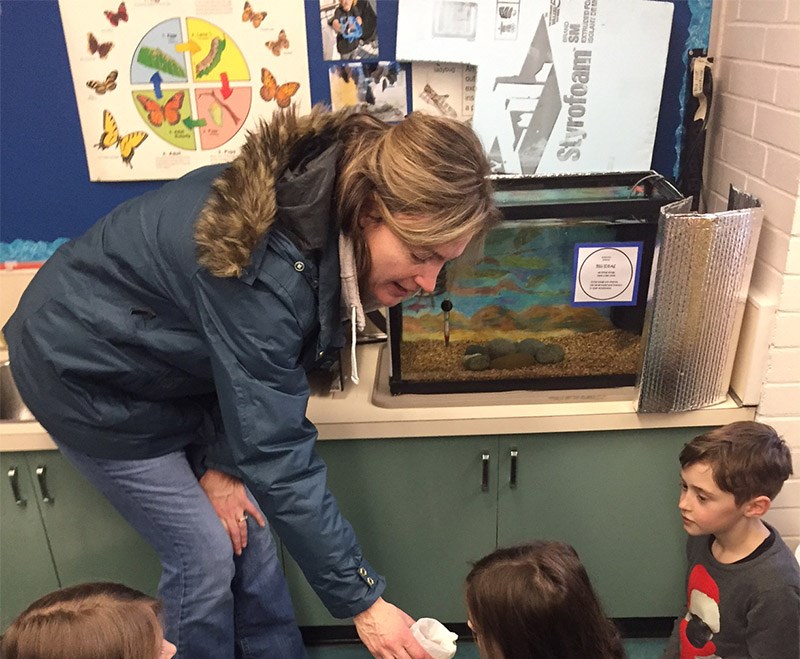A decision to delay for a year cuts to an education program that teaches children about the lifecycle of B.C. salmon has Tri-City teachers and hatchery organizations hoping that it may be saved.
The Salmonids in the Classroom program will go ahead in schools in September after Fisheries and Oceans Canada made some adjustments in the wake of a community outcry, meaning that teachers can go ahead and collect salmon eggs and raise them to fry stage in the classroom this fall.
But the longstanding B.C. program will not likely to continue in its current form next year, and on Monday, Coquitlam-Port Coquitlam Liberal MP Ron McKinnon acknowledged that petitions and letters are one way for people to ensure that their concerns are heard.
“They should carry on, hold our feet to the fire and make sure we follow through,” McKinnon told The Tri-City News as letters and petitions continue to circulate online.
McKinnon explained that the planned changes to the 40-year-old Salmon Enhancement Program (SEP) are part of a broader review and investment to enhance marine and coastline protection, with $27 million to be spent on the SEP program alone.
WE CAN DO BETTER
As well, he said Fisheries and Oceans Canada will be adding 900 staff, including 200 in B.C., as part of a $2.9-billion investment into the Ocean Protection Plan and restoration of previous cuts to Fisheries and Oceans Canada and the Canadian Coast Guard.
“The messaging on the first announcement didn’t emphasize we are going to put something in that is at least as good or better. That’s the point of the review: can we do better?” McKinnon said.
Still, it’s unclear as to what the new program will look like. Fisheries and Oceans Canada has promised to put education materials online, supplemented by visits of fisheries officers to B.C. schools.
“We want people to understand and people to know the whole life cycle of the salmon and a key to that is education. It might be done in a different way,” McKinnon said.
But local teachers say the program that provides tanks, fish eggs and a curriculum for teachers to use has enthralled and inspired children for three decades. Eliminating it and replacing it with online programming won’t be the same.
LEARNING
“Learning on screen is not the same as the same as an experience,” said Kerry Lockwood, a Pinetree secondary school teacher, who has two tanks at her Coquitlam school for science classes and who has volunteered as the program co-ordinator for SD43 for two decades, working with Fisheries and Oceans Canada’s education coordinator, whose contract will not be renewed if program changes go ahead.
“The petitions need to continue on, they need to see what this is dong,” Lockwood said.
For Lockwood, who has seen generations of kids learn about salmon through the program, eliminating it would be a blow.
“In the Tri-Cities alone, I’ve seen the streams go from having no salmon to being healthy,” she said, crediting awareness from Salmonids in the Classroom for getting people to support salmon enhancement.
The program also has many champions at the elementary school level.
At Westwood elementary in Port Coquitlam, for example, salmon are raised from eyed eggs to fry in a hallway so all students can witness the progress. In the spring, they are released in a ceremony blessed by local First Nations elders.
FITS CURRICULUM
“The kids can tell you so much about the salmon,” said teacher Paula Foster.
Teachers also like the way the program fits in with the redesigned B.C. curriculum, which requires students to learn about ecosystems as well First Nations cultural traditions.
“Having live salmon in the classroom where the children can see and experience this living thing hatch into alevins, grow into fry is experiential learning — the best kind, in my opinion,” stated Linda Appleby, a Lord Baden-Powell elementary teacher, in an email. “I have been implementing the Salmonids in the Classroom Program for about 20 years with classes from grades 2 to 5 and I am shocked that it has come to the chopping block with such speed and accuracy considering how perfectly it fits in with the new curriculum and the rationale behind it.”
For now though, the program will continue even though the future is still very much uncertain. Two petitions are calling for restoration of funding at petitions.ourcommons and at change.org (search “salmonids” on either site).
MP McKinnon agrees that educating people about the salmon is critical for their protection and acknowledges that the species is iconic in B.C.
But his government’s decisions are being questioned by the federal NDP, led by fisheries critic and Port Moody-Coquitlam MP Fin Donnelly, who delivered a letter describing the benefits of the program.
Also being cut are technicians who help groups manage their hatcheries — although their contracts are also being retained for a year — while other technical support provided by the Resource Restoration Unit will be phased out over three years.



